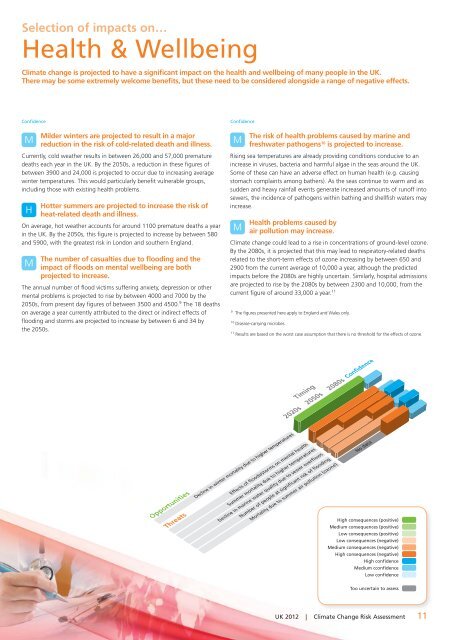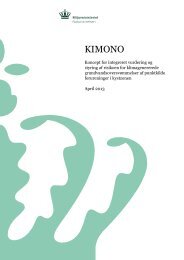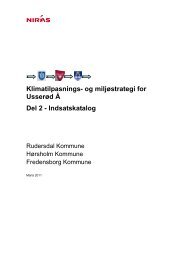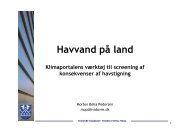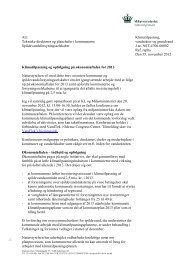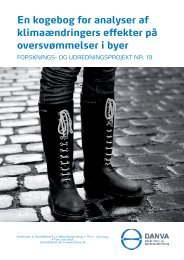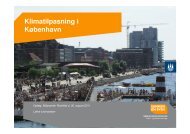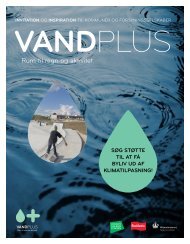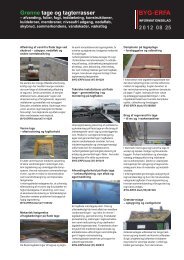Summary of key findings from the CCRA - Defra
Summary of key findings from the CCRA - Defra
Summary of key findings from the CCRA - Defra
Create successful ePaper yourself
Turn your PDF publications into a flip-book with our unique Google optimized e-Paper software.
Selection <strong>of</strong> impacts on…<br />
Health & Wellbeing<br />
Climate change is projected to have a significant impact on <strong>the</strong> health and wellbeing <strong>of</strong> many people in <strong>the</strong> UK.<br />
There may be some extremely welcome benefits, but <strong>the</strong>se need to be considered alongside a range <strong>of</strong> negative effects.<br />
Confidence<br />
Confidence<br />
M<br />
Milder winters are projected to result in a major<br />
reduction in <strong>the</strong> risk <strong>of</strong> cold-related death and illness.<br />
M<br />
The risk <strong>of</strong> health problems caused by marine and<br />
freshwater pathogens 10 is projected to increase.<br />
Currently, cold wea<strong>the</strong>r results in between 26,000 and 57,000 premature<br />
deaths each year in <strong>the</strong> UK. By <strong>the</strong> 2050s, a reduction in <strong>the</strong>se figures <strong>of</strong><br />
between 3900 and 24,000 is projected to occur due to increasing average<br />
winter temperatures. This would particularly benefit vulnerable groups,<br />
including those with existing health problems.<br />
H<br />
Hotter summers are projected to increase <strong>the</strong> risk <strong>of</strong><br />
heat-related death and illness.<br />
On average, hot wea<strong>the</strong>r accounts for around 1100 premature deaths a year<br />
in <strong>the</strong> UK. By <strong>the</strong> 2050s, this figure is projected to increase by between 580<br />
and 5900, with <strong>the</strong> greatest risk in London and sou<strong>the</strong>rn England.<br />
M<br />
The number <strong>of</strong> casualties due to flooding and <strong>the</strong><br />
impact <strong>of</strong> floods on mental wellbeing are both<br />
projected to increase.<br />
The annual number <strong>of</strong> flood victims suffering anxiety, depression or o<strong>the</strong>r<br />
mental problems is projected to rise by between 4000 and 7000 by <strong>the</strong><br />
2050s, <strong>from</strong> present day figures <strong>of</strong> between 3500 and 4500. 9 The 18 deaths<br />
on average a year currently attributed to <strong>the</strong> direct or indirect effects <strong>of</strong><br />
flooding and storms are projected to increase by between 6 and 34 by<br />
<strong>the</strong> 2050s.<br />
Rising sea temperatures are already providing conditions conducive to an<br />
increase in viruses, bacteria and harmful algae in <strong>the</strong> seas around <strong>the</strong> UK.<br />
Some <strong>of</strong> <strong>the</strong>se can have an adverse effect on human health (e.g. causing<br />
stomach complaints among ba<strong>the</strong>rs). As <strong>the</strong> seas continue to warm and as<br />
sudden and heavy rainfall events generate increased amounts <strong>of</strong> run<strong>of</strong>f into<br />
sewers, <strong>the</strong> incidence <strong>of</strong> pathogens within bathing and shellfish waters may<br />
increase.<br />
M<br />
Health problems caused by<br />
air pollution may increase.<br />
Climate change could lead to a rise in concentrations <strong>of</strong> ground-level ozone.<br />
By <strong>the</strong> 2080s, it is projected that this may lead to respiratory-related deaths<br />
related to <strong>the</strong> short-term effects <strong>of</strong> ozone increasing by between 650 and<br />
2900 <strong>from</strong> <strong>the</strong> current average <strong>of</strong> 10,000 a year, although <strong>the</strong> predicted<br />
impacts before <strong>the</strong> 2080s are highly uncertain. Similarly, hospital admissions<br />
are projected to rise by <strong>the</strong> 2080s by between 2300 and 10,000, <strong>from</strong> <strong>the</strong><br />
current figure <strong>of</strong> around 33,000 a year. 11<br />
9 The figures presented here apply to England and Wales only.<br />
10 Disease-carrying microbes.<br />
11 Results are based on <strong>the</strong> worst case assumption that <strong>the</strong>re is no threshold for <strong>the</strong> effects <strong>of</strong> ozone.<br />
High consequences (positive)<br />
Medium consequences (positive)<br />
Low consequences (positive)<br />
Low consequences (negative)<br />
Medium consequences (negative)<br />
High consequences (negative)<br />
High confidence<br />
Medium cconfidence<br />
Low confidence<br />
Too uncertain to assess<br />
UK 2012 | Climate Change Risk Assessment 11


